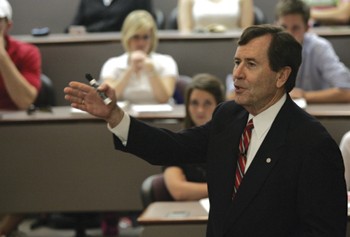
President R. Gerald Turner speaks to students in the Hughes-Trigg Forum during the President’s Leadership Summit Wednesday.
No one said leadership was easily definable, least of all SMU President R. Gerald Turner.
But during yesterday’s President’s Leadership Summit, he tried to do just that.
Turner said experience, expertise and personality were key to being a successful leader, whatever the organization.
“When you look at what you’re sorting people on” when choosing leadership roles, he said, “those three variables always come up.”
He also listed five things that can get in the way of good judgment, another vital quality of an effective leader.
According to Turner, impulsivity, lack of experience, insecurity, self-centeredness and a faulty information base can all contribute to poor decision-making.
One of the hardest things to do as a leader, said Turner, is to keep in mind our personality and prejudices when you’re confronted with a problem.
“My Masters is in counseling psychology … so if you’re angry, that’s your trouble,” he said. “I let you own it, then I don’t get so self-centered that I get angry” and lose sight of the problem.
Turner didn’t start out his career wanting to be president of a university.
“When I proposed to my wife, Gail, I told her I intended to be a famous experimental psychologist,” he said.
But he quickly went off track after being nominated to serve as a divisional chair at Pepperdine.
“A lot of people tell you – and it’s true – that if you’re open to opportunities before you, what you plan to do isn’t what you’re going to be doing,” he said.
Turner competed for the position at Pepperdine to save its two psychological research labs, but wound up an associate vice president.
From there, he went to the University of Oklahoma as a vice president. The lack of experience -he’d been an associate vice president at Pepperdine for six months – “nearly killed me,” he said.
“People across the university came in to ask me things … and for the first two weeks” nearly every decision he made had to be cleaned up.
“It was the first time I ever really doubted my ability,” he said.
Turner defined judgment as the ability to predict all outcomes of a decision (along with chain reactions) and added that it’s “a major reason that people start failing.”
“You’re told when you have good judgment,” he said. “When you don’t, the usual response is, ‘Why didn’t I think of that?'”
Turner ended the lecture by telling students to keep working hard.
“The time you’re in now, you’re shaking yourself in ways you probably don’t know,” he said. “If you’ve got energy and good judgment, something may happen for you like it did for me.”
According to Dr. Carol Clyde of the Leadership and Community Involvement Office, the summit is “a multi-departmental effort.”
Vice President of Student Affairs Jim Caswell said the lectures, held twice every semester, are designed to support the LCI office from the university level.
“The idea was that these people would come and share personal stories,” he said. He wants students to get an opportunity to view role models in a less formal way, though Turner “didn’t follow that exactly,” he said.
Senior Lauren Ostergren said she heard about the summit via e-mail.
“It was really interesting to hear President Turner speak about his personal experiences,” she said. “I think it’s great the president of our university is this involved with the students.”
Junior Jessica Jones said, “The points President Turner touched on are very applicable, especially to my organization,” she said. “I thought it was to the point.”








